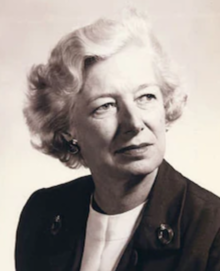
Summary
Mary Caroline "Polly" Hughes Budenbach (April 18, 1914 – June 23, 2005) was an American cryptanalyst. She won the Federal Woman's Award in 1969, and was posthumously inducted into the NSA Hall of Honor in 2017.
Mary Hughes Budenbach | |
|---|---|
 Mary "Polly" Budenbach, from a website of the National Security Agency | |
| Born | April 18, 1914 New York City |
| Died | June 23, 2005 (aged 91) New Jersey |
| Occupation | Cryptanalyst |
Early life and education edit
Mary Caroline Hughes was born in New York City[1] and raised in Scotch Plains, New Jersey,[2] the daughter of Harold Lincoln Hughes and Jane Plunkett Hughes. She attended The Hartridge School and graduated from Smith College in 1934, with a bachelor's degree in English.[3]
Career edit
During World War II, Budenbach worked as a cryptanalyst with the United States Navy in Washington, D.C., focused on Japanese naval cryptosystems.[2] After the war, she continued working in as a cryptanalyst and consultant. After 1953, she was senior cryptologist, administrator, and, at one point, the highest-paid woman at the National Security Agency (NSA),[4] based at Fort George G. Meade in Maryland.[5] She worked on computerizing analytical tasks in cryptology, and chaired a committee on promotion and assignment for women at the NSA.[6] She described her work in 1969 as "challenging, fascinating, interesting and frustrating, but not romantic."[7]
Budenbach was recognized with the Navy's Meritorious Civilian Service Award in 1945. In 1969, she received the Federal Woman's Award.[8][9] "When they heard of the award, many of my friends came to me and said 'Now we know where you work'," she told a reporter in 1969.[5] In 1975, the year she retired from the NSA, she received the agency's Exceptional Civilian Service Award.[4]
Personal life edit
Mary Hughes married stockbroker Theodore Oswald Budenbach in 1940.[3] He died in 1982.[10] She died in New Jersey in 2005, aged 91 years.[6]
Posthumous honors edit
Budenbach's story was included in the book Code Girls: The Untold Story of the American Women Code Breakers of World War II (2017), by Liza Mundy.[11] Also in 2017, she was posthumously inducted into the NSA Hall of Honor.[6][12][13]
References edit
- ^ Weekly Compilation of Presidential Documents. Office of the Federal Register, National Archives and Records Service, General Services Administration. 1969. p. 374.
- ^ a b "'Polly' Budenbach". The Link: Bulletin of the National Cryptologic Foundation Museum Inc. 8: 8. Summer 2005.
- ^ a b "MISS MARY HUGHES WED IN PLAINFIELD; Becomes Bride of Theodore O. Budenbach in Crescent Ave. Presbyterian Church". The New York Times. 1940-01-13. ISSN 0362-4331. Retrieved 2021-10-23.
- ^ a b Frahm, Jill (2003). Mary (Polly) Hughes Budenbach, Cryptologic Almanac, 50th Anniversary Series. via Internet Archive
- ^ a b Levi, Linda (1969-03-14). "Award Given". The Baltimore Sun. p. 14. Retrieved 2021-10-24 – via Newspapers.com.
- ^ a b c "Mary H. "Polly" Budenbach". National Security Agency. Retrieved 2021-10-23.
- ^ Moran, Cynthia K. (1969-03-21). "She Breaks Codes for Uncle Sam". The Courier-News. p. 9. Retrieved 2021-10-24 – via Newspapers.com.
- ^ Hitt, Patricia Reilly (July–September 1969). "Ninth Annual Federal Woman's Award". Civil Service Journal. 10: 14–15.
- ^ "Area Woman Honored by Government". The Courier-News. 1969-02-17. p. 17. Retrieved 2021-10-24 – via Newspapers.com.
- ^ "Theodore O. Budenbach (death notice)". The Courier-News. 1982-12-29. p. 11. Retrieved 2021-10-24 – via Newspapers.com.
- ^ Mundy, Liza (2017). Code girls : the untold story of the American women code breakers of World War II. New York. pp. 342, 392. ISBN 978-0-316-35253-6. OCLC 972386321.
{{cite book}}: CS1 maint: location missing publisher (link) - ^ "NSA Cryptologic Hall of Honor". National Cryptologic Foundation. Retrieved 2021-10-23.
- ^ "Five pioneers inducted into the NSA/CSS Cryptologic Hall of Honor". Intelligence Community News. 2017-11-05. Retrieved 2021-10-24.


